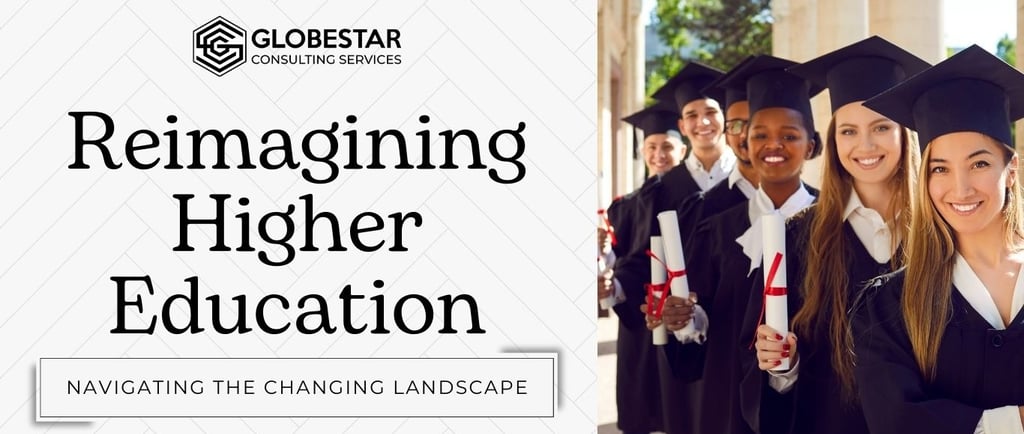
Reimagining Higher Education: Navigating the Changing Landscape
Today’s world is considerably different from the one which inspired the creation of our colleges, Universities and education system. Universities, once taught to be the sole propagators of knowledge are no longer ONLY sources of information. With one specialization, master of one subject, listening to classroom lectures by experts, today’s young minds cannot adequately prepare for the complex world out. In order to prepare our current youth to create the sustainable future of tomorrow, there is a need to restructure and reorganize the whole education system.
3/28/20243 min read


Today’s world is considerably different from the one which inspired the creation of our colleges, Universities and education system. Universities, once taught to be the sole propagators of knowledge are no longer ONLY sources of information. With one specialization, master of one subject, listening to classroom lectures by experts, today’s young minds cannot adequately prepare for the complex world out. In order to prepare our current youth to create the sustainable future of tomorrow, there is a need to restructure and reorganize the whole education system.
As we all know, in recent years, higher education has faced increasing scrutiny and challenges stemming from technological advancements, changing demographics, economic pressures, and evolving student needs. To remain relevant and effective, universities and colleges worldwide are compelled to reimagine their approaches to teaching, learning, and institutional structures by recognising new realities in the education world. This article explores key trends and strategies in reimagining higher education to meet the demands of the 21st century.
Embracing Technology: The integration of technology in higher education means not just keeping pace with trends but also about leading and envisioning the future. Technology continues to revolutionize education, offering new opportunities for personalized learning, collaboration, and accessibility. From online courses and virtual reality simulations to data analytics and artificial intelligence, institutions must leverage technology to enhance teaching and learning experiences. Blended learning models that combine online and traditional classroom instruction can cater to diverse student needs and preferences while expanding access to education beyond geographical boundaries. Adapting new age technologies not just improves the life of a student and professor, this will revolutionize the role of administrators, researchers, and all other drake holders in institutions, thus making the institution FUTURE READY.
Focus on Lifelong Learning: The traditional model of higher education, centered around a four-year degree, is no longer sufficient to meet the demands of today's dynamic job market. Lifelong learning has become essential for individuals to adapt to changing skill requirements and remain competitive in their careers. Universities must offer flexible, modularized programs that enable learners to acquire new skills and credentials incrementally throughout their lives. Micro-credentials, boot camps, and competency-based assessments can play a crucial role in this paradigm shift towards lifelong learning.
Promoting Diversity, Equity, and Inclusion: Higher education institutions must prioritize diversity, equity, and inclusion (DEI) to create environments that foster belonging and support the success of all students, faculty, and staff. This entails implementing proactive recruitment and retention strategies for underrepresented groups, integrating multicultural perspectives into the curriculum, and addressing systemic barriers to equity. By embracing DEI principles, universities can enrich learning experiences, promote social justice, and prepare students to thrive in a diverse world.
Enhancing Career Readiness: Employers increasingly seek candidates with not only academic knowledge but also practical skills, adaptability, and emotional intelligence. Higher education must align curricula with workforce needs, offering experiential learning opportunities, internships, and career development resources. Collaborations with industry partners can provide students with real-world experiences and insights, ensuring they graduate with the competencies required for success in their chosen fields.Also, with various career readiness programmes well in advance can expose students to prepare themselves for the real world.
Fostering Innovation and Entrepreneurship: All educational institutions hold a crucial role in fostering a culture of Entrepreneurship. Shifting from producing job seekers to job givers, Universities should serve as hubs of innovation, driving economic growth and societal progress through research, entrepreneurship, and knowledge transfer. By cultivating an entrepreneurial mindset among students and faculty, institutions can nurture creativity, critical thinking, problem-solving skills, and a culture of innovation. Incubators, accelerators, and interdisciplinary collaboration spaces can facilitate the development of startups and innovative solutions to global challenges.
Adapting to Globalization: Higher education is increasingly globalized, with students, faculty, and ideas crossing borders more freely than ever before. Institutions must embrace internationalization initiatives, including study abroad programs, cross-cultural exchanges, and partnerships with overseas universities. By fostering global competence and intercultural understanding, universities can prepare students to navigate an interconnected world and contribute to global citizenship and diplomacy.
In conclusion, reimagining higher education requires a holistic and forward approach that addresses the complex challenges and opportunities facing universities today. By embracing innovation, diversity, lifelong learning, student centric approach and a commitment to excellence, institutions can adapt to the evolving needs of students and society while remaining at the forefront of knowledge creation and dissemination. Through collaborative efforts and visionary leadership, higher education can continue to fulfill its mission of empowering individuals and transforming communities in the 21st century and beyond.
Contact Us
WeWork, C - 20, G Block BKC, G Block, Bandra Kurla Complex, Bandra East, Mumbai, Maharashtra 400051
+91 91678 64137
+91 76667 12345
Resources
© Globestar Edutech Pvt Ltd
Licence
Site Map
FAQ
Work with us


